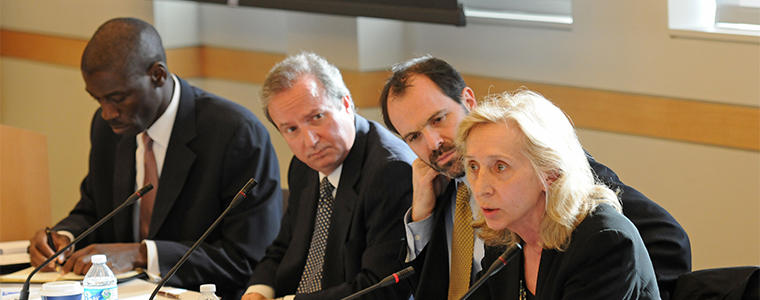The Economic and Development Transition in Afghanistan: Looking Beyond 2014
The World Bank, in cooperation with the Afghan Ministry of Finance, has been engaged in a study of the fiscal, economic, capacity, service delivery and employment/poverty implications of anticipated declines in external funding for Afghanistan. The main findings from this study, which were shared with delegates at the Afghanistan International Conference in Bonn, were presented for the first time publicly in the U.S. at this USIP event. A distinguished panel of experts discussed the implications of the findings, focusing on how to manage the changes and mitigate adverse effects while exploiting potential opportunities created by the transition.
Read the event coverage, After 2014: Managing the Transition in Afghanistan

The anticipated declines in international military and development assistance to Afghanistan during the coming years are going to have a major impact on Afghanistan's government budget and economy. These in turn will have significant implications for Afghanistan's future stability and development. To date, however, this economic transition has received relatively little policy attention in comparison to the attention given to the security transition in Afghanistan. The World Bank, in cooperation with the Afghan Ministry of Finance, has been engaged in a study of the fiscal, economic, capacity, service delivery and employment/poverty implications of anticipated declines in external funding for Afghanistan. The main findings from this study, which were shared with delegates at the Afghanistan International Conference in Bonn, were presented for the first time publicly in the U.S. at this USIP event. A distinguished panel of experts discussed the implications of the findings, focusing on how to manage the changes and mitigate adverse effects while exploiting potential opportunities created by the transition.
Speakers
- Ernesto May, presenter
Director, Poverty Reduction and Economic Management - South Asia Region
The World Bank Group - J. Alexander Thier, panelist
Assistant to the Administrator and Director, Office of Afghanistan and Pakistan Affairs
U.S. Agency for International Development - Christine Mulligan, panelist
former Country Director, Afghanistan
Mercy Corps - Stanley S. Byers, panelist
Director, Afghanistan-Pakistan Directorate
National Security Council - Raymond Gilpin, moderator
Associate Vice President, Sustainable Economies, Centers of Innovation
United States Institute of Peace



